In 1215 the Barons of England forced King John to sign the Magna Carta -
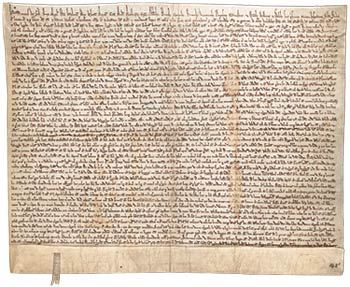
Picture: Magna Carta
This great charter was an important document which aimed to limit the powers of the king and protect the rights of the aristocracy.
Magna Carta has been influential on many constitutions written since and forms the basis of the United States Constitution.
Magna Carta contained clauses relating to Forest issues, and was followed in 1217 by a seperate 'Carta de Foresta' -
The Angevin Kings (Henry I, Richard the Lionheart and King John) had been very powerful since they came to power in 1154; and they had expanded royal jurisdiction across all aspects of their realm.
Their thirst for power was manifested in their expansion of Forest law over many new areas of the country. In Nottinghamshire the Forest Law was spread across all of Nottinghamshire north and west of the River Trent.
Much to the displeasure of the local ruling classes.
The expansion of Forest law -
In 1215 the barons had (as said) forced King John to sign Magna Carta; at Runneymead on the 10th June.
The King signed the document, but he had little intention of yielding to its demands. He had the support of the pope who agreed that the document was improper as it had been extracted under duress.
The pope anulled Magna Carta; and the King turned on his enemies-
During this conflict King John is believed to have lost the crown Jewels on the coast of the 'Wash' in eastern England, before dying in the gate house at Newark Castle, Nottinghamshire in 1216.
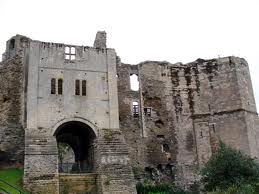
Picture: Newark Castle gatehouse where King John died in 1216.
The Barons had replaced John with King Louis -
Following John's death the great general and tournament champion William Marshall persuaded the Barons to accept John's son Henry III who was crowned King in 1216.
Louis was defeated-
There is no King Louis in the list of English and British Monarchs.
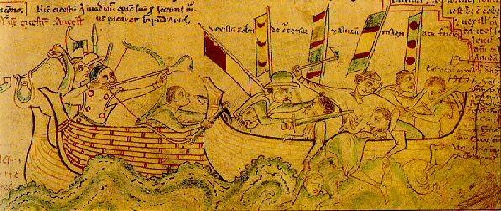
Picture: Defeat of the French at the Battle of Sandwich 1217
Magna Carta was reissued in 1216/17 this time with a separate Charter of the Forest.
This charter was signed under William Marshall who was acting as regent to the 9 year old Henry III.
Magna Carta had contained an number of forest clauses designed to limit forest law.
These limits on forest law were further extended in 1217 when a separate Charter of the Forest was proclaimed.
Picture: Part of the Charter of the Forest
There were 17 proclamations in the charter. Including those related to removing the claws of dogs, which persons could hunt with hawks, and those allowing Bishops and other high powered folk to take a deer whilst passing through the forest.
The charter outlined and enshrined many of the common rights of peasant and landowners to access Forest lands, to utilise resources, and for the grazing of livestock.
Perhaps the most important elements were limitations on the extents of the forest, and the banning of execution and mutilation as punishments against people who killed deer in the forest.
The removal of execution, torture and maiming had a great effect on the implementation of forest law.
Over time it became more about extracting fines and levies-
Perhaps the most important impact for Sherwood Forest was the restriction it placed on the bounds of the forest.
Under Henry II and his sons Richard and John all of Nottinghamshire north and west of the Trent were forest.
The Forest Charter plunged the officials and local landowners into nearly a century of disputes over the boundaries of Sherwood Forest, that would eventually see it confined within boundaries that would then remain throughout the Medieval period.
These boundaries may well have been those of the original forest, a question still being investigated by Archaeologists and Historians to this day.
(Andy Gaunt, first published 19/10/2012)
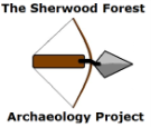


Community Archaeology Nottinghamshire, Community Archaeology Derbyshire, Community Archaeology Leicestershire, Community Archaeology East Midlands, Mercian Archaeological Services Community Archaeology for Nottinghamshire, Derbyshire, Sherwood Forest, Leicestershire and the East Midlands. Community Archaeology Nottinghamshire, Community Archaeology East Midlands, Community Archaeology Leicestershire. Archaeological

Bothamsall Castle and Sherwood Forest
Award Winners 2016
for "Engaging people in the heritage, history & archaeology of Sherwood Forest".





Some funders and partners:
World-









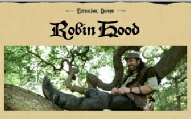

Mercian Archaeological Services CIC
Specialists in Community Archaeology, Public Involvement, Research & Training
Community Archaeology Nottinghamshire, Excavation, Research, Volunteering, Community Archaeology Derbyshire, Training, Social, Learning, Community Archaeology Leicestershire, Heritage, Involvement, Belonging, Knowledge sharing, Community Archaeology Lincolnshire, Topographic Survey, Talks and Presentations, Outreach, Archaeology Projects , Open Days, Schools, Finds Processing, Day Schools, Field Schools, Young People, Archaeology and History of Sherwood Forest, Pottery Research, Medieval, Roman, Prehistoric, Community Interest Company, Community Archaeology Nottinghamshire.
Community Archaeology in Nottinghamshire
Community Archaeology in Derbyshire
Community Archaeology in Leicestershire
Community Archaeology East Midlands
Community Archaeology in Lincolnshire
© Mercian Archaeological Services CIC 2013. Registered Business No. 08347842. All Rights Reserved.
The Future of Sherwood’s Past
Project page links:
-
-
-
-
-
-
-
-
The Sherwood Forest
National Nature Reserve Archaeology Survey
-
Long term Research at
King John’s Palace:
Ancient Royal Heart of Sherwood Forest
-
The Sherwood Forest Archaeology Training Fieldschool
-
“Scirwuda-
Ghost and Shadow woods of Sherwood Forest Project
-
Investigating Thynghowe Viking
Meeting Site
-
Searching for the
The Battle of Hatfield
-
-
Fieldswork at St Edwin’s Chapel
-
St Mary’s Norton-
-
Mapping Medieval Sherwood Forest
-
The Sherwood Forest LiDAR
Project
-
Warsop Old Hall
Archaeological Project
-
The Sherwood Villages Project:
Settlement Development in the Forest
-
-
-
Researching Edward IIs fortification at Clipstone Peel
-
-
-
-
The Cistercians of Rufford Project:
Settlement Development, Dynamics and Desertion.
-
Sherwood Forest Environmental Survey
-
World War II in Sherwood Forest -
-
World War I in Sherwood Forest -
-
About Medieval Sherwood Forest
-
Robin Hood and Sherwood Forest
-
-
-
-
-
-
-
-
-
-
-
-
Project page links:
-
-
-
-
-
-
-
-
The Sherwood Forest
National Nature Reserve Archaeology Survey
-
Long term Research at
King John’s Palace:
Ancient Royal Heart of Sherwood Forest
-
The Sherwood Forest Archaeology Training Fieldschool
-
“Scirwuda-
Ghost and Shadow woods of Sherwood Forest Project
-
Investigating Thynghowe Viking
Meeting Site
-
Searching for the
The Battle of Hatfield
-
-
Fieldswork at St Edwin’s Chapel
-
St Mary’s Norton-
-
Mapping Medieval Sherwood Forest
-
The Sherwood Forest LiDAR
Project
-
Warsop Old Hall
Archaeological Project
-
The Sherwood Villages Project:
Settlement Development in the Forest
-
-
-
Researching Edward IIs fortification at Clipstone Peel
-
-
-
-
The Cistercians of Rufford Project:
Settlement Development, Dynamics and Desertion.
-
Sherwood Forest Environmental Survey
-
World War II in Sherwood Forest -
-
World War I in Sherwood Forest -
-
About Medieval Sherwood Forest
-
Robin Hood and Sherwood Forest
-
-
-
-
-
-
-
-
-
-
-
-